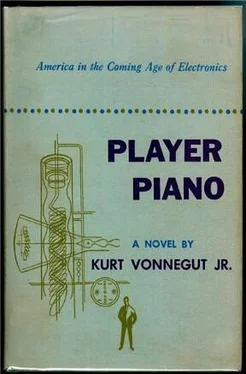His car - in the old days, anyway - had been more disreputable than Paul's was today. In this direction, at least - the most innocuous direction, socially - Paul had imitated his friend. Finnerty had claimed that his love of books and records and good whisky kept him too broke to buy a car and clothes commensurate with his position in life. Paul had computed the value of Finnerty's record, book, and bottle collections and concluded that the Irishman would still have plenty left for even two new cars. It was then that Paul began to suspect that Finnerty's way of life wasn't as irrational as it seemed; that it was, in fact, a studied and elaborate insult to the managers and engineers of Ilium, and to their immaculate wives.
Why Finnerty had seen fit to offend these gentle people was never clear to Paul, who supposed the aggressiveness, like most aggressiveness, dated back to some childhood muddle. The only intimation as to what that childhood had been like had come not from Finnerty but from Kroner, who took a breeder's interest in his engineers' bloodlines. Kroner had once remarked, confidingly and with a show of sympathy, that Finnerty was a mutant, born of poor and stupid parents. The only insight Finnerty had ever permitted Paul was in a moment of deep depression, during a crushing hangover, when he'd sighed and said he'd never felt he belonged anywhere.
Paul wondered about his own deep drives as he realized how much pleasure he was getting from recollections of Finnerty's socially destructive, undisciplined antics. Paul indulged himself in the wistful sensation of feeling that he, Paul, might be content, if only - and let the thought stop there, as though he knew vaguely what lay beyond. He didn't.
Paul envied Finnerty's mind, for Finnerty could be anything he wanted to be, and be brilliant at it. Whatever the times might have called for, Finnerty would have been among the best. If this had been the age of music, Finnerty would have been, and in fact was, a top-flight pianist - or he might have been an architect or physician or writer. With inhuman intuition, Finnerty could sense the basic principles and motives of almost any human work, not just engineering.
Paul could have been only what he was, he thought. As he filled his glass again, he supposed that he could only have come to this moment, this living room, into the presence of Anita.
It was an appalling thought, to be so well-integrated into the machinery of society and history as to be able to move in only one plane, and along one line. Finnerty's arrival was disturbing, for it brought to the surface the doubt that life should be that way. Paul had been thinking of hiring a psychiatrist to make him docile, content with his lot, amiable to all. But now, here was Finnerty, pushing him in the other direction. Finnerty had seemed to see something in Paul he hadn't seen in the others, something he'd liked - possibly a rebellious streak that Paul was only now beginning to suspect. For some reason Finnerty had made Paul his only friend.
"In a way, I wish Finnerty'd picked another day," said Anita. "It raises all sorts of problems. Baer's supposed to be on my left, and Kroner on my right; but now, with a member of the National Industrial Planning Board blowing in unexpectedly, I'm not sure who goes where. Is Ed Finnerty bigger brass than Kroner and Baer?" she asked incredulously.
"Look in the Organization Directory , if you want," said Paul. "I think you'll find the N.I.P.B. is listed ahead of the regional people - but it's more brain trust than brass. Finnerty won't care. He'll probably eat with the help."
"If he sets foot in the kitchen, the Board of Health will throw him in jail." She laughed uneasily. It was evident that she found it trying to be a good sport about Finnerty, to pretend that his eccentricities were amusing. She changed the subject. "Tell me about today."
"Nothing about today. One more, like all the rest."
"You got the whisky?"
"Yes. I had to go across the river to get it."
"Was it such an awful ordeal?" she chided. She couldn't understand why he hated to run errands into Homestead, and teased him about it. "Was it so awful?" she said again, bordering on baby talk, as though he were a lazy little boy coaxed into doing a small favor for his mother.
"Pretty bad."
"Really?" She was surprised. "Nothing violent, I hope."
"No. Everybody was very polite, in fact. One of the pensioners recognized me from the old days and threw an impromptu party for me."
"Well, that sounds like downright fun."
"Does, doesn't it? His name is Rudy Hertz." Without describing his own reactions, he told her what had happened. He found himself watching her closely, experimenting.
"And that upset you?" She laughed. "You are a sensitive darling, aren't you? You tell me you've been through a nightmare, and nothing happened at all."
"They hate me."
"They proved they loved and admired you. And, what's more, they should."
"The man with the thick glasses as much as said his son's life wasn't worth living on account of me."
"You said that. He didn't. And I won't have you saying ridiculous things like that. Do you get some sort of pleasure out of making things up to feel guilty about? If his son isn't bright enough for anything but the Reeks and Wrecks or the Army, is that your fault?"
"No; but if it hadn't been for men like me, he might have a machine in the plant -"
"Is he starving?"
"Of course not. Nobody starves."
"And he's got a place to live and warm clothes. He has what he'd have if he were running a stupid machine, swearing at it, making mistakes, striking every year, fighting with the foreman, coming in with hangovers."
"You're right, you're right." He held up his hands. "Of course you're right. It's just a hell of a time to be alive, is all - just this goddamn messy business of people having to get used to new ideas. And people just don't, that's all. I wish this were a hundred years from now, with everybody used to the change."
"You're tired. I'm going to tell Kroner you need a month off."
"I'll tell him, if I feel like it."
"I wasn't trying to run your life, darling. But you never ask for anything."
"Let me do the asking, if you don't mind."
"I don't. I promise you I don't mind at all."
"Did you lay my things out?"
"On your bed," she said primly. She'd been hurt. "Tuxedo, shirt, socks, studs, cuff links, and a new tie."
"New tie?"
"Dubonnet."
"Dubonnet! For Christ's sake."
"Kroner and Baer are wearing dubonnet ties."
"And is my underwear like theirs?"
"I'm sure I didn't notice."
"I'm wearing a black tie."
"Pittsburgh, darling - remember? You said you wanted to go there."
"Hi ho, dubonnet." He climbed the stairs to their bedroom, stripping off his coat and shirt as he went.
"Ed!" Finnerty was stretched out on Anita's bed.
"So there you are," said Finnerty. He pointed at the tuxedo laid out on Paul's bed. "I thought this was you. I've been talking to it for half an hour."
"Anita said you'd gone to the club."
"Anita expelled me out the front door, so I came in the back and up here."
"Well, I'm glad you did. How are things?"
"Worse than ever, but there's hope."
"Fine," said Paul, laughing uncertainly. "Married?"
"Never. Shut the door."
Paul closed it. "How's the Washington job?"
"I've quit."
"Really? Something bigger yet?"
"I think so, or I wouldn't have quit."
"Where?"
"No place. No job at all."
"Not enough pay, or worn out, or what?"
"Sick of it," he said slowly. "The pay was fantastically good, ridiculously good - paid like a television queen with a forty-inch bust. But when I got this year's invitation to the Meadows, Paul, something snapped. I realized I couldn't face another session up there. And then I looked around me and found out I couldn't face anything about the system any more. I walked out, and here I am."
Читать дальше








![Курт Воннегут - Вампитеры, фома и гранфаллоны [litres]](/books/397997/kurt-vonnegut-vampitery-foma-i-granfallony-litre-thumb.webp)